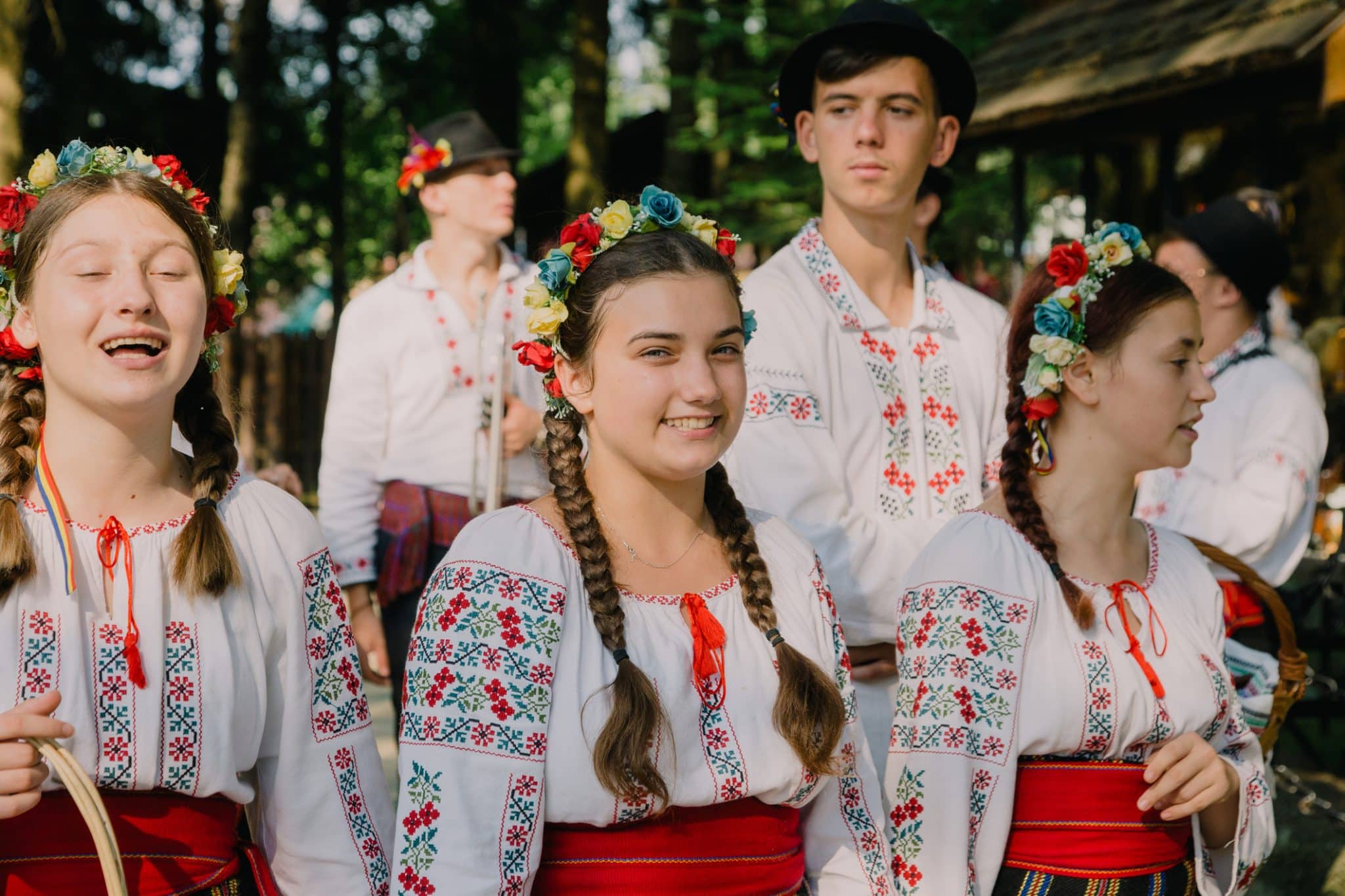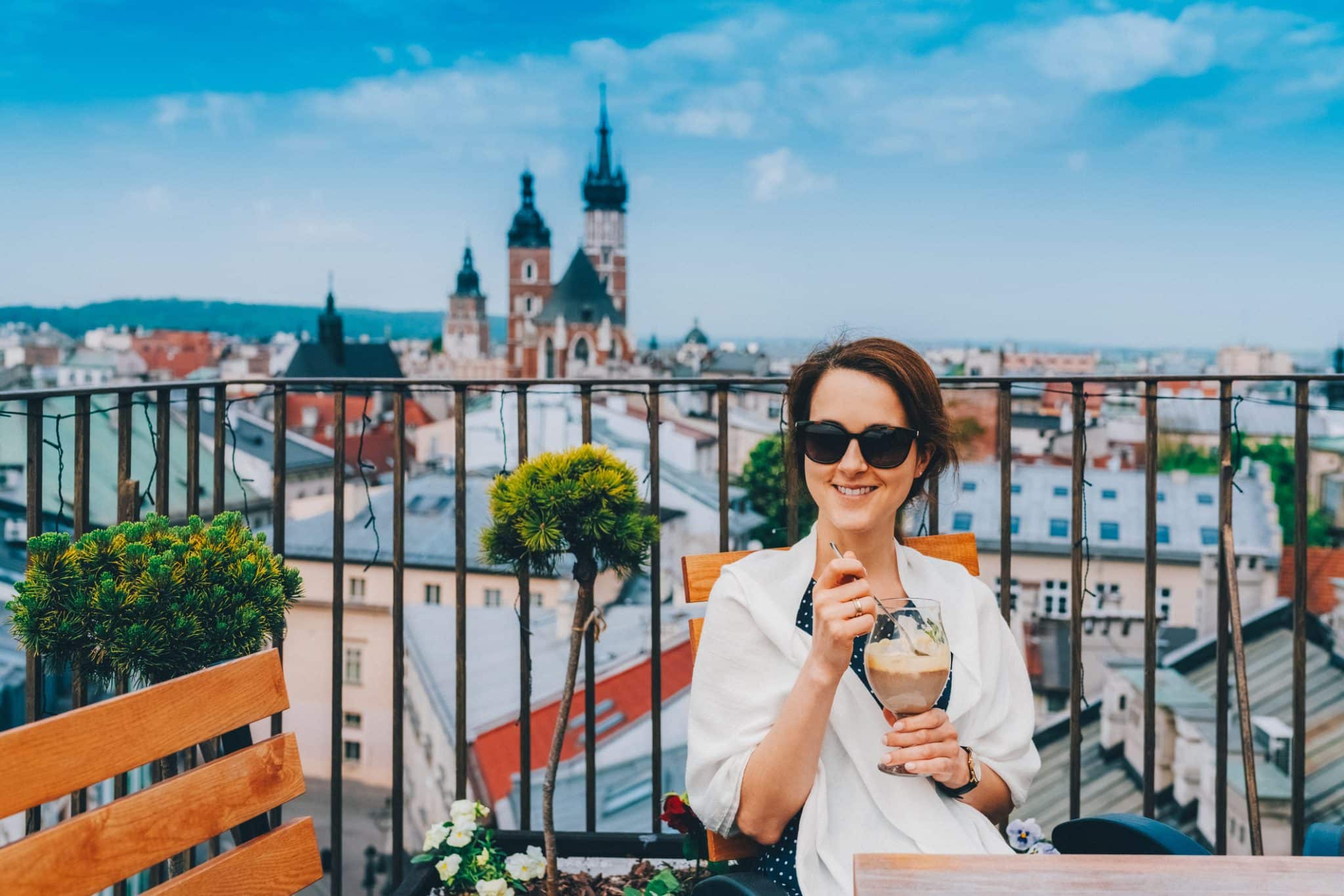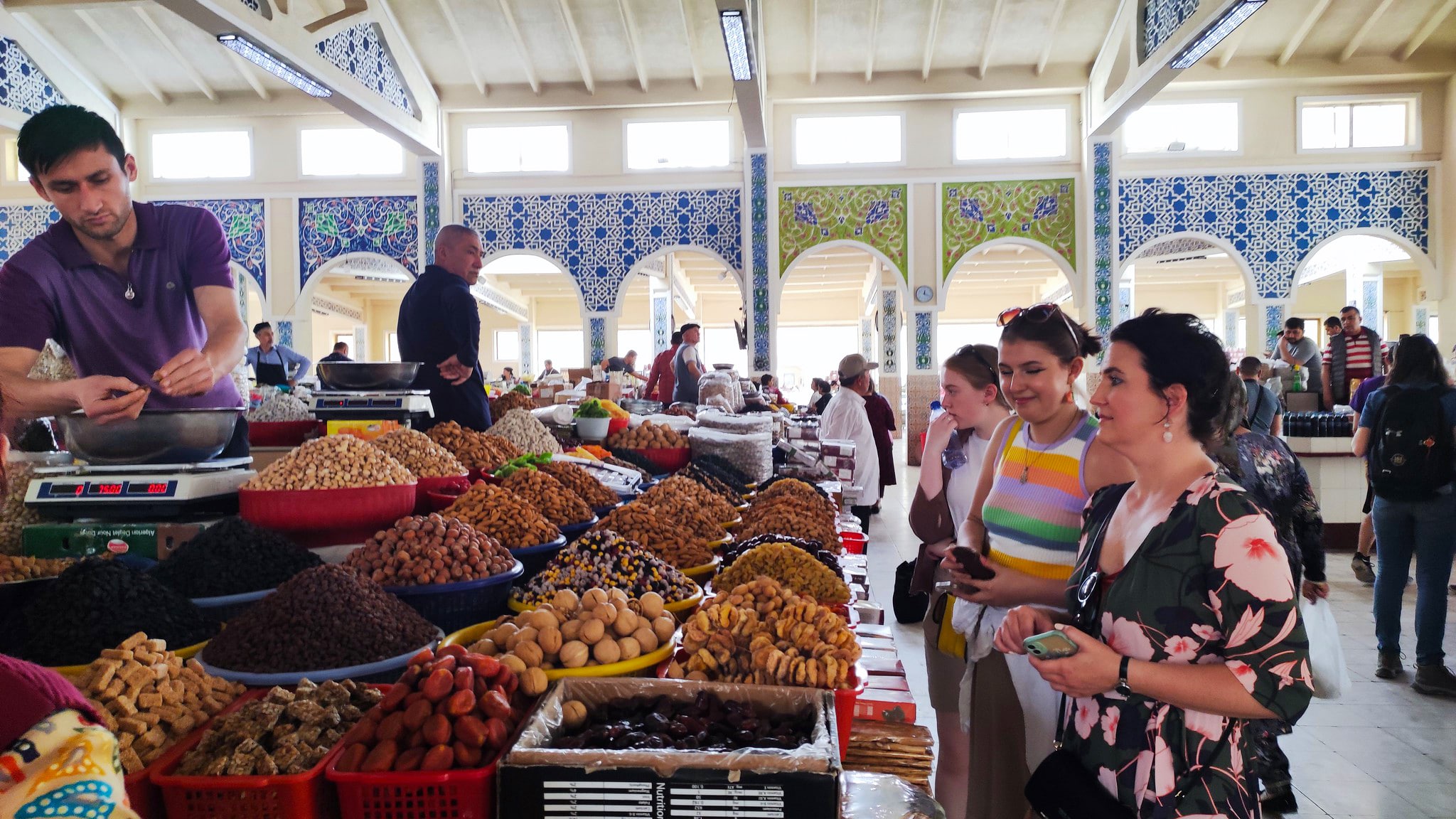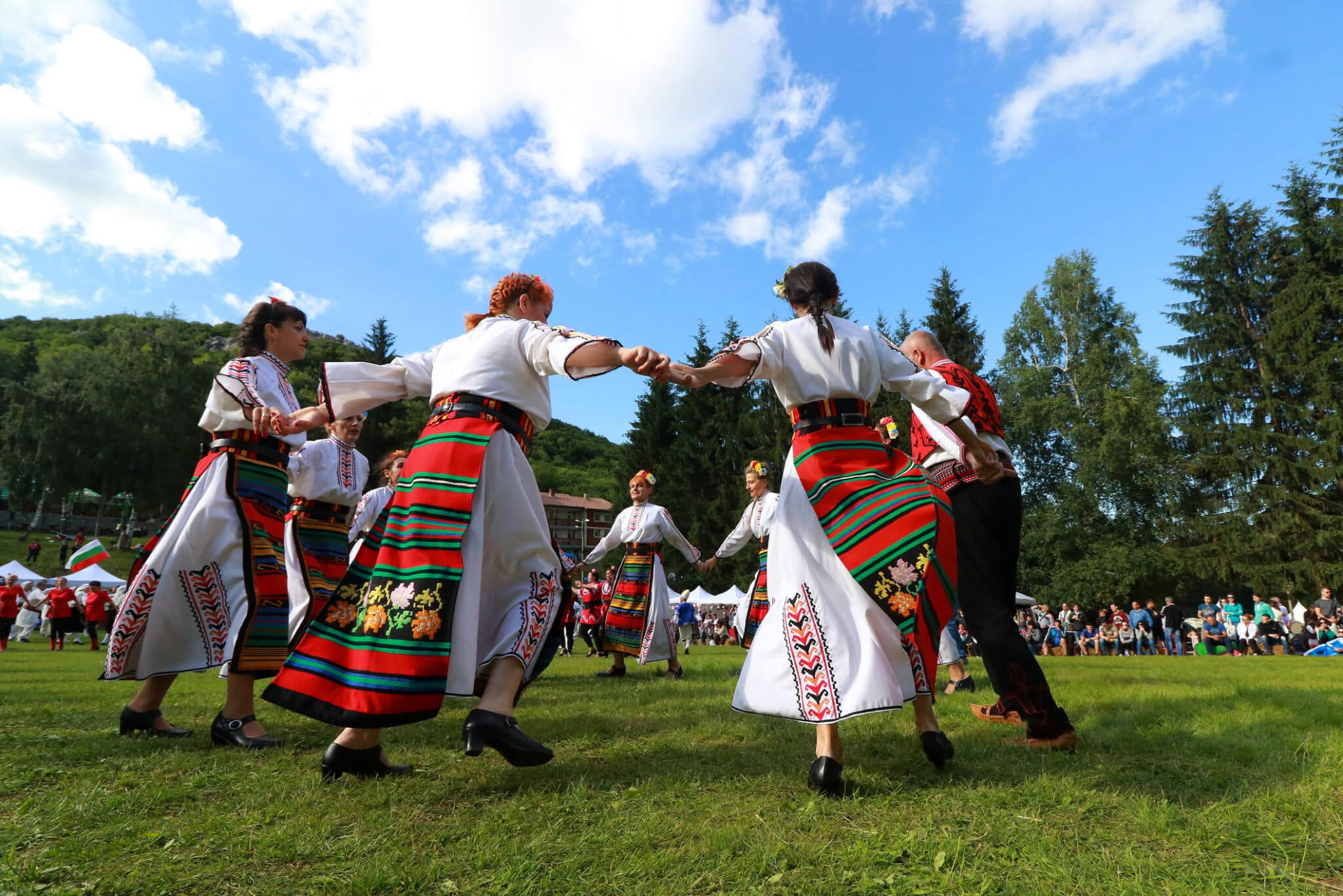The Talking Phrasebook Series presents useful phrases and words in side-by-side translation and with audio files specifically geared to help students work on listening skills and pronunciation. Each entry below, divided by category, features an English word or phrase in the left column and its Bulgarian translation in the right.
In the center column for each row is a play button. The recorded file will feature first English, then the Bulgarian in three versions: one slow, one with each syllable broken out, and a last version that will be spoken as it might be overheard in a conversation between native speakers.
Facts About Bulgarian
- No infinitives. Bulgarian uses no infinitives. Instead, both verbs are conjugated depending on the person. In English, this would look like: She likes writes (meaning, “she likes to write”). In Bulgarian, it looks like this: “Тя обича да пише.”
- Alphabet pride. Bulgaria is the birthplace of the Cyrillic alphabet. The Bulgarian Empire was the first to adopt the old Slavic Glagolitic script for official state purposes. That script was originally developed by brothers Cyril and Methodius as part of their efforts to spread Christian practices in Slavic lands. In Bulgaria specifically, the Cyrillic alphabet was developed later from the Glagolitic by Naum and Clement, two former students of Cyril and Methodius. Further, many Bulgarians believe that Cyril and Methodius were specifically Bulgarian. (While they were probably Greek and perhaps partly Slavic, the history is not universally agreed upon.) The two are celebrated as national heroes in Bulgaria with an official holiday each May 24.
- Gender. Bulgarian uses gender (male, female, and neuter) for nouns but has some confusing rules for it. For instance, masculine nouns are typically indicated by a consonant endings: брат (brother), ден (day). However, masculine nouns may take on the feminine – a and -я endings and neuter -о and -е endings when referring to a male person. Such masculine nouns include баща (father), колега (colleague), вуйчо (uncle on mother’s side). Feminine nouns, typically with – a and -я endings, can also likewise end with a constant, e.g. нощ (night), кръв (blood), част (part). Neuter nouns usually end in -о and -е, although they also include foreign words that end in -ю, -у, and -и. For example, действие (action), палто (coat), меню (menu), and уиски (whiskey) are all neuter. The one exception to this is that the months of the year, despite most ending in и, are all masculine. The forms of both adjectives and verbs can change based on the gender on the noun, which means that correctly using gender in Bulgarian is important but quite challenging.
- Respect. Bulgarian differentiates between informal and formal speech to show respect. When speaking to a single person who you know well (friend, close relative), you use the singular “you” (ти; ti). Meanwhile, if speaking to a stranger or person of respect (teacher, boss, or generally for someone older than you), you use the plural “you” (вие; vie) – even when speaking to a singular person. For example:
– How are you? Как си ти? (singular “you”, informal): you’re catching up with a relative
– Как сте вие? (plural “you”, formal): you are a person in your 20s talking to your elderly neighbor - Articles. The definite article “the” is added as an extra syllable at the end of a noun or adjective. Scandinavian languages are similar. The type of ending depends largely on gender. If there is an adjective, the definite ending is added to the adjective and omitted from the noun. The definite ending is used even in constructions involving possession, unlike English which does not. The indefinite article “a” is not used in Bulgarian. Here are some examples of singular nouns:
– Мост (bridge; masculine indefinite); мостът (masculine definite if subject); моста (masculine definite if not subject)
– Книга (book; feminine indefinite); книгата (feminine definite)
– Куче (dog; neuter indefinite); кучето (neuter definite)
HOWEVER, If you use an adjective with the noun, for instance for “the brown dog,” the definite ending would be applied only to the adjective and not the noun, so it would become бялото куче. - Asking Questions: Question words in Bulgarian include the following:
- Who: кой (koi)
- What: какво (kakvo)
- Why: защо (zashto)
- Where: къде (kyde)
- How: как (kak)
Survival Basics in Speaking Bulgarian
| Hi! | Zdrasti! (Здрасти) *informal, conversational – to greet a friend, neighbor, acquaintance, family member |
|
| Hello! | Zdravei! (Здравей) *informal, conversational – to greet a friend, neighbor, acquaintance, family member |
|
| Hello! | Zdraveite! (Здравейте!) *more formal – to greet a teacher, stranger/passerby, elderly |
|
| Yes | Da (Да) |
|
| No | Ne (Не) |
|
| Good morning! | Dobro utro! (Добро утро!) |
|
| Good afternoon! | Dobyr den (Добър ден!) |
|
| Good evening! | Dobyr vecher! (Добър вечер!) |
|
| What’s up? | Kakvo stava? (Какво става?) |
|
| How are things? | Kak e pri teb? (Как е при теб?) |
|
| How are you? | Kak si? Kak ste? (informal/formal) (Как си? Как сте?) |
|
| Good, thank you, and you? | Dobre, blagodarya, a ti/vie? (informal/formal) (Добре, благодаря, а ти/вие?) |
|
| Bye! | Chao! (Чао!) *informal, conversational |
|
| Good bye! | Dovizhdane! (Довиждане!) *more formal |
|
| Good bye! | Vsichko dobro! (Всичко добро!) (literally “all the best”) *more formal |
|
| See you later! | Do pokysno! (До по-късно!) |
|
| Sorry! | Izvinyavai/Izvinyavaite! (Извинявай/Извинявайте!) |
|
| Open/closed | Otvoreno/zatvoreno (Отворено/затворено) |
|
| Pull/push | Drypni/butni (Дръпни/бутни) *when referring to a door |
|
| Small/big | Malyk/golyam (Малък/голям) |
|
| Do you speak English? | Govorish li angliiski / Govorite li angliiski (Говориш ли английски? Говорите ли английски? (informal/formal) |
|
| I don’t speak English. | Az ne govorya angliiski. (Аз не говоря английски.) |
|
| I only speak a little Bulgarian. | Az govorya samo malko bylgarski. (Аз говоря само малко български) |
|
| I understand/I don’t understand. | Az razbiram/Az ne razbiram. (Аз разбирам/Аз не разбирам.) |
|
| Thanks!/Thanks so much! | Mersi / Mersi mnogo! (informal) (Мерси!) / (Мерси много!) |
|
| Thank you!/Thank you very much! | Blagodarya / blagodarya mnogo! (formal) (Благодаря!) / (Благодаря много!) |
|
| Very well, thank you! | Mnogo dobre, blagodarya! (formal) (Много добре, благодаря!) |
|
| Well/poor | Dobre / losho (adv.)
(Добре / лошо) |
|
| Good/bad | Dobyr/dobra; losh/losha (adj. m/f) (Добър/добра; лош/лоша) |
|
| Please | Ako obichate
(Ако обичате) |
|
| You’re welcome! or No worries! | Molya! or Nyama zashto! (Моля! Няма защо!) *when responding to “mersi/blagodarya!” |
|
| Excuse me! | Izvinyavai/Izvinyavaite! (Извинявай/Извинявайте!) (informal/formal) |
|
| A little | Malko (Малко) |
|
| Could you speak more slowly? | Mozhe li da goborite po-bavno? (Може ли да говорите по-бавно?) |
|
| Could you repeat, please? | Povtorete, molya! (Повторете, моля!) (formal) |
|
| Could you write that down? | Mozhe li tova da go napishete? (Може ли това да го напишете?) |
|
| My bag/wallet/passport was stolen | Otkradnaha mi chantata/portmoneto/pasporta. (Откраднаха ми чантата/портмонето/паспорта). |
|
| I need a doctor! | Tryabva mi doktor! (Трябва ми доктор!) |
|
| Call the police! | Obadete se na politsiyata! (Обадете се на полицията!) (formal) |
Introductions in Bulgarian
| What is your name? | Kak se kazvash/kazvate? (informal/formal) (Как се казваш/казвате?) |
|
| Pleased to meet you! | Priyatno mi e da se zapoznaem! (Приятно ми е да се запознаем!) |
|
| I am 25 years old. | Az sym na dvadeset i pet godini. (Аз съм на двадесет и пет години.) |
|
| How old are you? | Na kolko godini si? (На колко години си?) |
|
| Where are you from? | Otkyde ste? (Откъде сте?) |
|
| I am American. | Az sym ot Amerika. (Аз съм от Америка) |
|
| No, I am from Canada. | Ne, az sym ot Kanada. (Не, аз съм от Канада) |
|
| She is Australian. | Tya e Avstralika. (Тя е австралика) |
|
| He is Irish. | Toi e irlandets. (Той е ирландец) |
|
| We are from New Zealand. | Nie sme ot Nova Zelandiya. (Ние сме от Нова Зеландия) |
|
| They are from Wales. | Te sa ot Uels. (Те са от Уелс) |
|
| How do you like Bulgaria? | Haresva li ti Bylgariya? (Харесва ли ти България?) |
|
| I like Bulgaria very much. | Bylgariya mnogo mi haresva. (България много ми харесва) |
|
| Have you ever been to Plovdiv? | Bili li ste v Plovdiv? (Били ли си/сте в Пловдив?) (formal) |
|
| I have never been to Varna before. | Az nikoga ne sym bil(a) v Varna. (Аз никога не съм бил(а) в Варна) |
|
| This is my second time in Bulgaria. | Za vtori pyt sym v Bylgariya. (За втори път съм в България) |
|
| What do you do? | S kakvo ce zanimavash? (С какво се занимаваш?) |
|
| I am a student/businessman/teacher/doctor. | Az sym student/biznesmen/uchitel/doktor. (Аз съм студент/бизнесмен/учител/доктор) |
|
| I am on vacation. | Az sym na vakantsiya (if you’re a student on a holiday break)/otpuska (if you’re working) (Аз съм ваканция/отпуска.) |
|
| I am here on business. | Az sym tuk po rabota. (Аз съм тук по работа). |
Asking Directions
| Where are the toilets? | Kyde sa toaletnite? (Къде са тоалетните?) |
|
| Men’s | Myzhki (Мъжки) (adj.) |
|
| Women’s | Zhenski (Женски) (adj.) |
|
| Where is the nearest bank? | Kyde e nai blizkata banka? (Къде е най-близката банка?) |
|
| Where is the nearest post office? | Kyde e nai blizkata poshta? (Къде е най-близката поща?) |
|
| Where is the nearest train station? | Kyde e nai bliskata zhe. pe. gara? (Къде е най-близката ж. п. гара?) |
|
| Where can I find Wi-Fi? | Kyde moga da namerya Wi-Fi? (Къде мога да намеря Wi-Fi?) |
|
| Do you know the Wi-Fi password? | Znaete li parolata za Wi-Fi-to? (Знаете ли паролата за Wi-Fi-то?) (formal) |
|
| How can I order a taxi? | Kak da namerya taksi? (Как да намеря такси?) |
|
| Straight ahead! | Napravo! (Направо!) |
|
| Take a right!/left! | Otidi na dyasno/yavo (Отиди на дясно/ляво) |
|
| After the stoplight | Sled svetofara (След светофара) |
|
| Next/First/Last | Sledvashtiyat/Pyrvi/Posleden (Следващият/първи/последен) |
Shopping
| How much does that cost? | Kolko struva tova? (Колко струва това?) |
||
| The menu, please! | Menyoto, molya! (Менюто, моля!) |
||
| I’d like a beer, please | Az bih ickala bira, molya (Аз бих искала бира, моля). |
||
| I’d like the bill, please. | Mozhe li smetkata, molya? (Може ли сметката, моля?) |
||
| Do you accept credit cards? | Mozhe li s kreditna karta? (Може ли с кредитна карта?) |
Counting
| 0 | nula (нула) |
|
| 1 | (see 0 for recording) |
edno (едно) |
| 2 | (see 0 for recording) |
dve (две) |
| 3 | (see 0 for recording) |
tri (три) |
| 4 | (see 0 for recording) |
chetiri (четири) |
| 5 | (see 0 for recording) |
pet (пет) |
| 6 | (see 0 for recording) |
shest (шест) |
| 7 | (see 0 for recording) |
sedem (седем) |
| 8 | (see 0 for recording) |
osem (осем) |
| 9 | (see 0 for recording) |
devet (девет) |
| 10 | (see 0 for recording) |
deset (десет) |
| 11 | edinadeset (единадесет) |
|
| 12 | dvanadeset (дванадесет) |
|
| 13 | trinadeset (тринадесет) |
|
| 14 | chetirinadeset (четиринадесет) |
|
| 15 | petnadeset (петнадесет) |
|
| 16 | shestnadeset (шестнадесет) |
|
| 17 | sedemnadeset (седемнадесет) |
|
| 18 | osemnadeset (осемнадесет) |
|
| 19 | devetnadeset (деветнадесет) |
|
| 20 | dvadeset (двадесет) |
|
| 21 | dvadeset i edno (двадесет и едно) |
|
| 22 | (see 21 for recording) |
dvadeset i dve (двадесет и две) |
| 30 | trideset (тридесет) |
|
| 40 | chetirideset (четиридесет) |
|
| 50 | petdeset (петдесет) |
|
| 60 | shestdeset (шестдесет) |
|
| 70 | sedemdeset (седемдесет) |
|
| 80 | osemdeset (осемдесет) |
|
| 90 | devedeset (деведесет) |
|
| 100 | sto (сто) |
|
| 111 | (see 100 for recording) |
sto i edinadeset (сто и единадесет) |
| 125 | (see 100 for recording) |
sto dvadeset i pet (сто двадесет и пет) |
| 200 | (see 100 for recording) |
dvesta (двеста) |
| 300 | (see 100 for recording) |
trista (триста) |
| 400 | (see 100 for recording) |
chetiristotin (четиристотин) |
| 500 | (see 100 for recording) |
petstotin (петстотин) |
| 600 | (see 100 for recording) |
sheststotin (шестстотин) |
| 700 | (see 100 for recording) |
sedemstotin (седемстотин) |
| 800 | (see 100 for recording) |
osemstotin (осемстотин) |
| 900 | (see 100 for recording) |
devetstotin (деветстотин) |
| 1000 | (see 100 for recording) |
hilyada (хиляда) |
More on Bulgarian Grammar (Pronoun Focus)
Below are listed the personal pronouns as they appear in nominative, accusative, and dative.
Nominative
These are used when the subject of the sentence. For example,
I am hungry: Аз съм гладен (az sym gladen)
She loves to travel: Тя обича да пътува (tya obicha da pytuva)
In the nominative, the subject is clearly in the act of doing (e.g. I am drinking, she is dancing), so Bulgarians often omit it. In other words, instead of saying “I am drinking,” Bulgarians will just say “Am drinking” with the “I” being implied.
| I: аз (az) | We: ние (nie) |
| You: ти (ti) | You (formal/plural): вие (vie) |
| He, she, it: той, тя, то (toi, tya, to) | They: те (te) |
Accusative (direct object)
These are used when a direct object of a transitive verb. For example,
I love him: Аз го обичам (аz go obicham)
I don’t know him: Аз не го познавам (аz ne go poznavam)
| Me: ме (me) | We: ни (ni) |
| You: те (te) | You (formal/plural): ви (vi) |
| Him, her, it: го, я, го (go, ya, go) | Them: ги (gi) |
The reflexive “се” (se) used when referring to oneself:
Do you like yourself? Харесваш ли се? (haresvash li se?)
I am getting (myself) ready: Приготвам се (prigotvam se)
Accusative (object of a preposition)
These are used as the object of a preposition. For example,
Are you thinking about it?: Мислиш ли за него? (mislish li za nego?)
I went to the store with her: Отидах до магазина с нея (otidah do magazina c neya).
| Me: мене (mene, often said as “men” colloquially) | Us: нас (nas) |
| You: тебе (tebe, often said as “teb” colloquially) | You (formal/plural): вас (vas) |
| Him, her, it: него, нея, него (nego, neya, nego) | Them: тях (tyah) |
The reflexive “себе си” (sebe si) used when referring to oneself:
I don’t think much about myself: Не мисля много за себе си (ne mislya mnogo za sebe si)
Dative (indirect object)
These are used when an indirect object. Within the indirect dative, there are two variants. The first is non-emphatic. For example, in the following sentence the focus in on the book:
She gave me the book: Тя ми даде книгата (tya mi dade knigata)
The second variant is emphatic. In other words, emphasis is on a particular person:
She gave the book to me (vs another person): Тя даде книгата на мене (tya dade knigata na mene)
Note that when the dative is non-emphatic, the personal pronoun must appear after the subject.
| Me: ми/на мене (mi/na mene) | Us: ни/на нас (ni/na nas) |
| You: ти/на теб (ti/na tebe) | You (formal/plural): ви/на вас (vi/na vas) |
| Him, her, it: му/на него, ѝ/на нея, му/на него (mu/na nego, i/na neya, mu/na nego) | Them: им/на тях (im/na tyah) |
The reflexive “си” (si) used when referring to oneself:
I will buy (myself) bread: Ще си купя хляб (shte si kupya hlyab)
Dative (possession)
These are used to indicate possession. Dative pronouns are used when the emphasis is on the object being possessed. For example:
This is my dog: Това е кучето ми (tova e kucheto mi)
Possessive pronouns (e.g. my, his, their – this is not dative) are used when the emphasis is on the possessor. These can be seen in sentences such as “This dog is mine” (emphasis is on the dog being “mine” not the dog itself). However, possessive pronouns are used far less frequently than the dative.
Below are the dative pronouns:
| Me: ми (mi) | Us: ни/на нас (ni/na nas) |
| You: ти (ti) | You (formal/plural): ви (vi) |
| Him, her, it: му, ѝ, му (mu, i, mu) | They: им (im) |
The reflexive “на себе си” (na sebe si) used when referring to oneself:
I bought a present (for myself): Купих подарък на себе си (kupih podaryk na sebe si).
Conjugations of “to be”
Notes: In colloquial settings, Bulgarians often omit the pronoun. However, know that when omitting the pronoun, the present form of “to be” cannot start the sentence. Therefore, the following are two ways to say “I am well,” the first with the pronoun and the second without.
Аз съм добре. Az sym dobre.
Добре съм. Dobre sym.
The following table lists the conjugations for the act of being, i.e. when there is no other verb.
How are you? I am well. (Как си ти? Аз съм добре.)
Where will she be? She will be in Burgas. (Къде ще бъде тя? Тя ще е в Бургас.)
Who was there? Dimitar’s kids were there. (Кой беше там? Децата на Димитър бяха там.)
| I аз (az) | You ти (ti) | He/she/it
той/тя/то (toi/tya/to) |
We
ние (nie) |
You (formal/plural)
вие (vie) |
They
те (te) |
| am
съм (sym) |
are
си (si) |
is
е (e) |
are
сме (sme) |
are
сте (ste) |
are
са (sa) |
| was
бях (byah) |
were
беше (beshe) |
was
беше (beshe) |
were
бяхме (byahme) |
were
бяхте (byahte) |
were
бяха (byaha) |
| have been (masculine):
съм бил (sym bil) have been (feminine): съм била (sym bila) |
have been (masculine):
си бил (si bil) have been (feminine): си била (si bila) |
has been
е бил (e bil) |
have been
сме били (sme bili) |
have been
сте били (ste bili) |
have been
са били (sa bili) |
| will be
ще съм (shte sym) |
will be
ще си (shte si) |
will be
ще е (shte e) |
will be
ще сме (shte sme) |
will be
ще сте (shte ste) |
will be
ще са (shte sa) |
More Phrasebooks

The Talking Romanian (in Moldova) Phrasebook
The Talking Phrasebook Series presents useful phrases and words in side-by-side translation and with audio files specifically geared to help students work on listening skills and pronunciation. Below, you will find several useful phrases and words. To the left is the English and to the far right is the Romanian translation. In the center column […]

The Talking Turkish Phrasebook
The Talking Phrasebook Series presents useful phrases and words in side-by-side translation and with audio files specifically geared to help students work on listening skills and pronunciation. Below, you will find several useful phrases and words. To the left is the English and to the far right is the Turkish translation. In the center column for […]

The Talking Estonian Phrasebook
The Talking Phrasebook Series presents useful phrases and words in side-by-side translation and with audio files specifically geared to help students work on listening skills and pronunciation. Below, you will find several useful phrases and words. To the left is the English and to the far right is the Estonian translation. In the center column […]

The Talking Polish Phrasebook
The Talking Phrasebook Series presents useful phrases and words in side-by-side translation and with audio files specifically geared to help students work on listening skills and pronunciation. Each entry below, divided by category, features an English word or phrase in the left column and its Polish translation in the right. In the center column for […]

The Talking Uzbek Phrasebook
The Talking Phrasebook Series presents useful phrases and words in side-by-side translation and with audio files specifically geared to help students work on listening skills and pronunciation. Below, you will find several useful phrases and words. To the left is the English and to the far right is the Uzbek translation. Uzbek is currently transitioning […]





